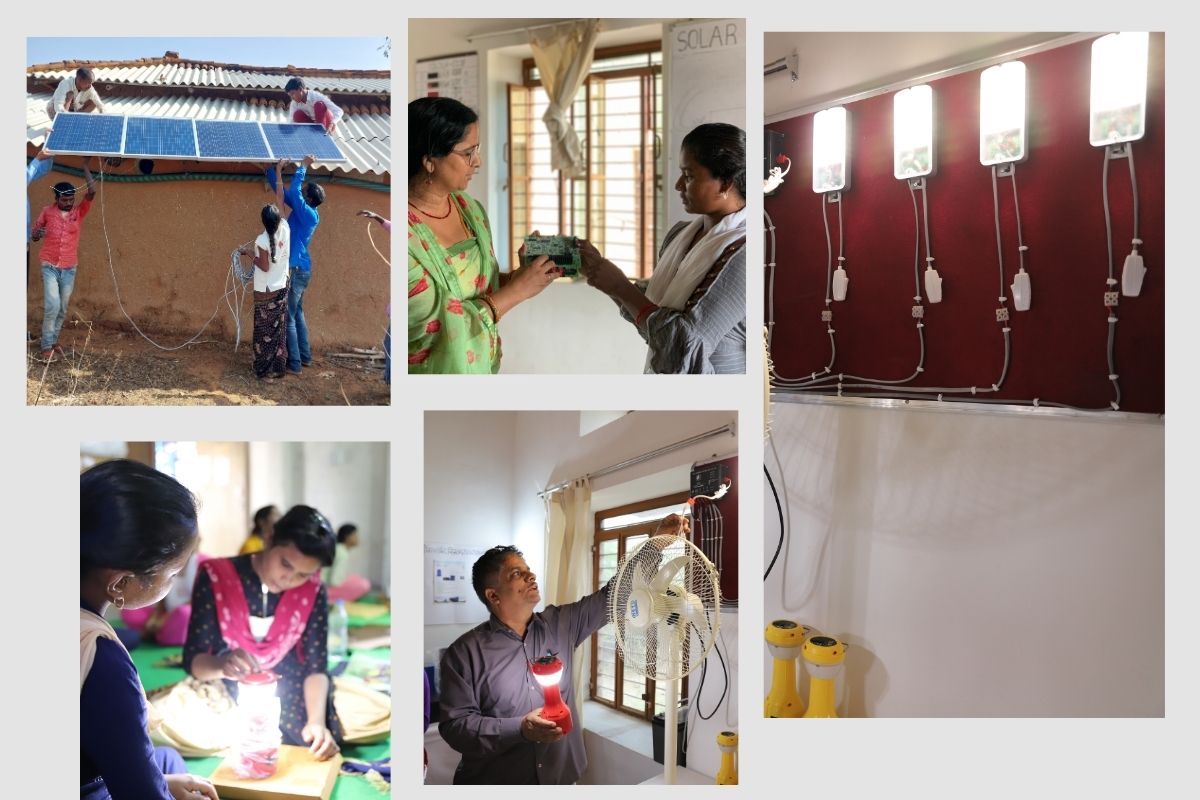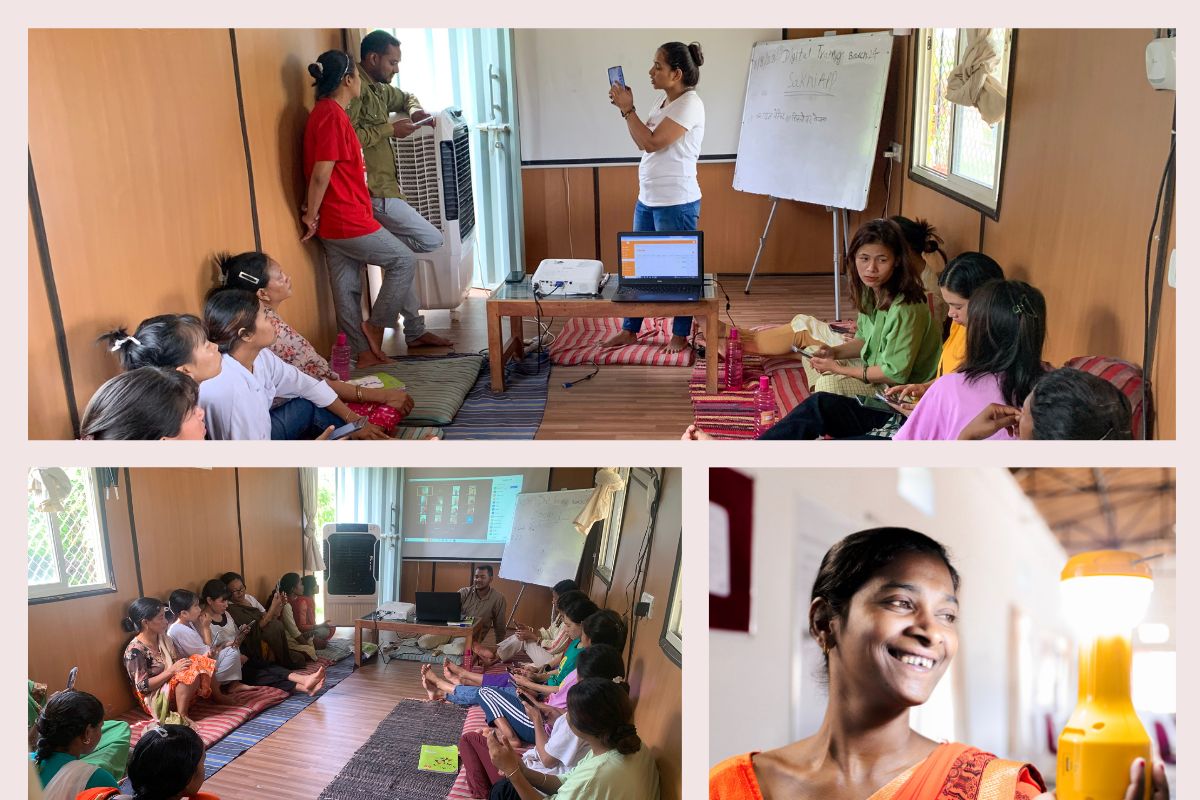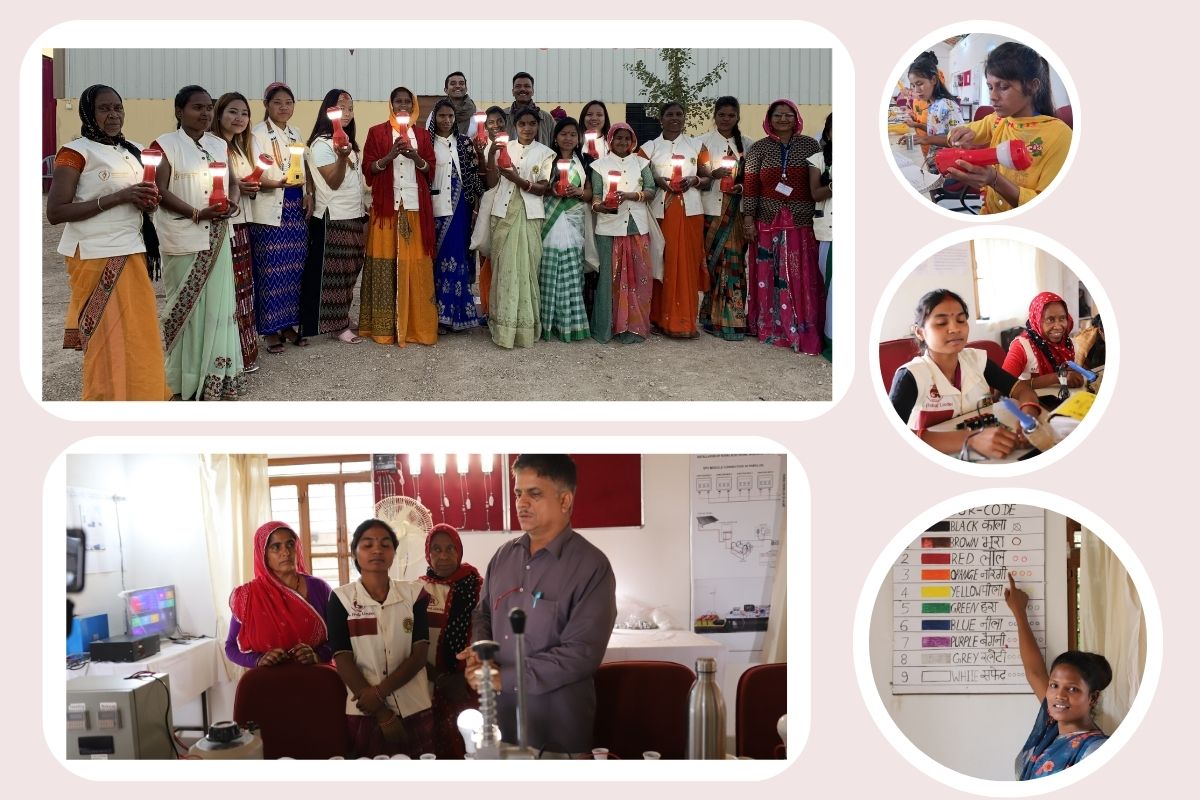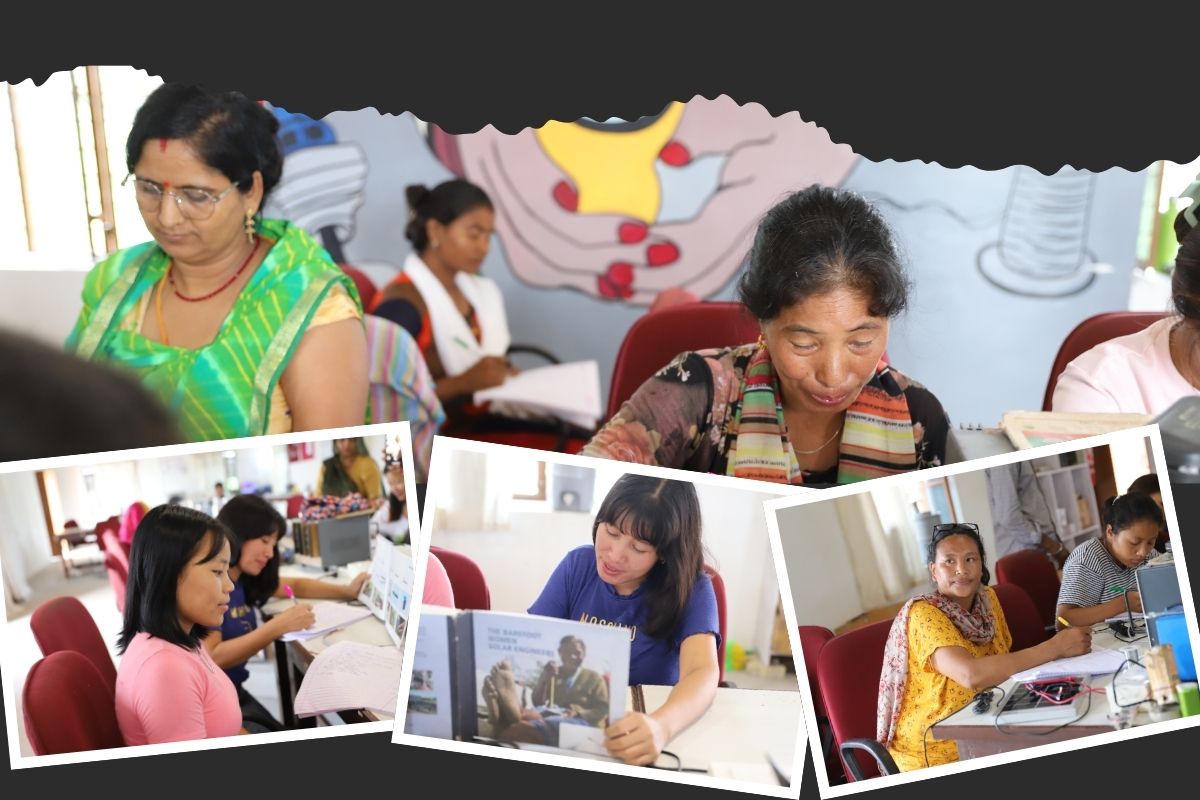The path less travelled often leads to the most profound destinations. Harsh Tiwari, an engineering graduate from BIT Mesra, began his journey conventionally, following the well-trodden career path of peers into the corporate world with MBA aspirations. However, while preparing for GMAT, a different route presented itself: a 13-month SBI Youth for India Fellowship. This opportunity aligned with his college social work experiences and service values, becoming a productive gap year that ultimately led to his leadership at EMPBindi International. Under his guidance, EMPBindi International now empowers women with technical expertise, paving the way for sustainable energy solutions and economic independence, truly following a less-travelled path.
But what was intended as a brief detour became a life-altering expedition. Working in India’s most underserved rural communities, Harsh witnessed firsthand the harsh realities that millions face—not because of absent government schemes, but due to gaps in awareness, access, and basic administrative support. Something as minor as an unrecognized fingerprint could disconnect someone from vital entitlements. Immobile or ill individuals were unnecessarily instructed to physically visit panchayat offices, despite available mobile registration units or manual overrides.
Harsh discovered that even rudimentary digital and administrative literacy—knowing how to draft an application or escalate an issue—could transform lives. His privilege manifested in tangible ways: proficiency in English, comprehension of government circulars, and navigation of online forms, which gave him the power to effect change where it mattered most.
After completing the fellowship, Harsh pursued his MBA on a full scholarship abroad, but intended to return to development work in India. The education equipped him with essential tools, networks, and exposure, but his commitment remained rooted in rural India. Upon graduating, he joined a local NGO in solar energy, experiencing firsthand the realities of NGO governance and institutional challenges.
For Harsh, the shift from corporate to development was not a sacrifice but a realignment of purpose. He found the perfect convergence of his electrical engineering background, management training, and grassroots experience. This journey led him to co-create and lead Bindi International, a rural innovation platform empowering women through renewable energy and community-led development.
Overcoming Cultural Barriers to Women’s Participation
The initial challenges in convincing families to allow women to participate in the five-month solar engineering training programme were formidable. Cultural norms, mobility restrictions, and deeply internalised beliefs created significant resistance. These women had never been told they could do anything beyond household work. Even those labouring in fields often did so without recognition, pay, or formal dignity—their work, like them, rendered invisible.
Recognising this, Bindi International invests the most time not in the training itself but in community dialogue and trust-building, going door-to-door, engaging with men, local leaders, and elders with a clear message:

“Energy will only flow into your village if women are sent for training. And if you’re willing to deposit a nominal fee—equal to what you’re already paying for mobile charging or kerosene—into a village account managed by a women-led committee.”
This condition serves both practical and symbolic purposes, placing trust, finances, and control in the hands of women and marking a critical turning point in the community’s perception. The success stories of returning trainees—equipped not just with skills but also with confidence, income, and community recognition—speak louder than any persuasive speech.
One of the most powerful transformations occurs in the eyes of the next generation. When children see their mothers, aunts, and neighbours—women once confined to household chores—soldering circuits, managing accounts, and leading community meetings, it shatters limiting beliefs about what women can achieve. These visible role models challenge restrictive norms and inspire a future where gender doesn’t dictate capability.
This ripple effect reshapes not only individual lives but the very fabric of communities, silencing the “this is not for us” narrative and opening doors to possibilities that once seemed unattainable. While policies and slogans may set the stage, these real stories of transformation—confidence, respect, and earned income— honestly rewrite cultural norms.
Simplifying Solar Engineering for Rural Women
At Bindi International, the approach to teaching solar engineering defies conventional classroom methods. From his engineering background, Harsh recognised that real-world applications don’t require encyclopedic technical knowledge. Technology’s evolution has simplified many once-complex processes, raising a fundamental question: why should someone from a rural background need a degree to install or repair increasingly modular and user-friendly solar panels?
Bindi believes in democratising technology for inclusive development. Their training methodology is deeply rooted in hands-on, visual, and context-based learning, using:
- Colour-coded wires, labelled components, diagrams, and storytelling
- Repeated practical work with circuits (at least 15 times) until understanding becomes muscle memory
- Local metaphors—comparing current flow to water through pipes, or battery logic to kitchen storage
- Teaching methods that align with how rural women already learn: by doing, sharing, and repeating

Rather than simplifying technology that is already becoming more accessible, Bindi focuses on streamlining access. When women realise they can master these skills, their confidence soars, and communities benefit from locally maintained renewable energy solutions.
Transformational Impact on Women’s Confidence and Social Standing
The transformation in women who complete the training is nothing short of remarkable. Take Thavri Devi, from an aspirational district in Sirohi, Rajasthan. Her village required an hour-long trek from the nearest town and had no access to electricity. Once soft-spoken and rarely voicing opinions in public, today she has literally and figuratively illuminated her village.
Thavri now speaks confidently at community meetings, raises health, education, and access issues, and serves as a spokesperson for her hamlet and the entire district. Her prominence earned her the honour of tossing the coin at the #PinkPromise match, transforming her from an unknown villager to a district mascot for empowerment. Later, she was honoured with the President’s Award for her leadership, and she even played a crucial role in the district’s voter awareness campaign, helping boost turnout in the last election.
The change extends beyond symbolism to practical realities. Thavri now travels independently, earns a stable income, and faces no work restrictions from her family—they’ve come to rely on her contributions and support her continued mobility and growth.
While Thavri’s story stands out, she represents countless others who have become solar engineers, entrepreneurs, and community leaders—quietly but consistently redefining the narrative of what rural women can achieve, create, and lead.
The Hub-and-Spoke Model: Creating Sustainable Energy Ecosystems
Bindi International operates on a hub-and-spoke model designed to ensure both technical reliability and deep community ownership through two complementary groups:
- Solar Engineers – Women trained in advanced technical skills like soldering, system installation, and diagnostics who act as the hub and are responsible for repairs, troubleshooting, and servicing of solar units.
- Solar Sakhis – Women based directly in villages who serve as community anchors, educating families on clean energy, supporting local businesses in adopting solar solutions, handling minor repairs, and distributing solar systems for aspirational uses like powering sewing machines, grinders, or lighting for evening tuition centres.
While initial engineering infrastructure is typically funded through CSR and grants, especially in energy-poor villages, introducing electricity unlocks new aspirations—families want to upgrade, start home-based businesses, and invest in solar-powered livelihoods.
The model transforms when Solar Sakhis and Bindi enable access via flexible, zero-cost EMI models. As communities understand energy’s value, many willingly invest in systems themselves, breaking the cycle of dependence.
This dual-layer approach ensures last-mile service with faster response times, trust-based adoption through local involvement, and two sustainable livelihood pathways for women—technical expertise and entrepreneurship—ultimately powering not just homes but dignity, enterprise, and self-reliance.

Ensuring Long-Term Sustainability and Maintenance
Sustainability isn’t an afterthought at Bindi—it’s engineered into the system from the beginning. Every deployed solar product is locally repairable, with women engineers trained not just in installation but also in diagnostics, fault detection, and part replacement. This enables them to handle common issues immediately and reduce downtime and dependency.
To support this infrastructure, Bindi establishes community-based workshops—smaller versions of its central training centres—stocked with essential spare parts. These workshops function as decentralised repair hubs and ongoing learning and enterprise spaces.
The organisation facilitates women-led committees that manage community energy accounts. Households contribute small regular amounts, often equivalent to previous expenditures on kerosene or mobile charging, creating a financial pool used to:
- Replace batteries or components when needed
- Pay stipends to trained women for repair and maintenance services
Beyond technical structures, Bindi maintains women’s engagement post-training through refresher workshops, peer support circles, and entrepreneurial mentoring.
While acknowledging that no system is perfect, some villages require customised approaches based on terrain, governance, or community dynamics—the model often sustains itself effectively, powered by local women, community trust, and shared ownership.
Redefining Traditional Gender Roles
When women begin earning through unconventional skills like solar engineering, it fundamentally reframes what’s “acceptable” in their communities. They transition from invisible to indispensable. Men who once doubted their capabilities now consult them for technical issues. Their daughters grow up with expanded possibilities, knowing their futures extend beyond household thresholds.
Memorable Success Stories
Countless powerful moments have marked this journey, each unforgettable in its way.
One particularly moving incident occurred in Jharkhand, where a newly trained woman solar engineer attended her village meeting. When asked to sit at the back with other women, she refused, instead dragging a chair next to the sarpanch and calmly stating: “I am the solar engineer of this village.” That moment of quiet defiance and absolute clarity carried more weight than any formal presentation on women’s empowerment.
Another source of pride is Bindi’s trainer network. Many trainers share the same rural backgrounds as their trainees. Today, they train hundreds of women across India and travel to Africa and Latin America to share their knowledge. These women, who once doubted their potential, now stand in classrooms worldwide, inspiring others who see themselves reflected in these teachers.
Many women who first received light in their homes have transformed that initial spark into broader community development, advocating for improved healthcare and education in their villages.
But the most profound imprint comes from Harsh’s team, colleagues, and mentors. Most originate from rural, underserved backgrounds, yet their ingenuity, intuition, and lived wisdom have shaped everything Bindi accomplishes. Any recognition of Harsh as a changemaker reflects the privilege of speaking about their work—they’ve made it possible for thousands to break poverty cycles, one connection at a time.
Supporting the Transition to Entrepreneurship
Bindi’s support extends well beyond technical training. Through their ENRICH Program—described as a “Rural MBA”—they help women build comprehensive foundations for entrepreneurship, including:
- Business planning
- Bank account setup
- Linkages to micro-finance institutions
- Budgeting and pricing models
- Market research and demand identification
Program graduates pursue diverse paths—some assemble solar kits, others become regional trainers, and many evolve into energy entrepreneurs managing decentralised franchises in their villages.
The organisation recognises that entrepreneurship presents unique challenges for rural women without credit histories, collateral, digital literacy, or sometimes even permission to leave home alone. These systemic gaps require extensive support, which Bindi provides by:
- Supplying initial tools and equipment
- Establishing quick-response systems for community needs
- Offering on-call mentorship for extended periods
This comprehensive, patient approach acknowledges that entrepreneurship isn’t created through training alone but through the supportive ecosystem built around each woman.

Crucial Partnerships and Government Support
One of Bindi’s most impactful collaborations has been with the Ministry of Skill Development and Entrepreneurship, particularly through the Green Jobs Skilling initiative. This partnership has enabled Bindi to secure government accreditation for their training centres, ensuring that program graduates receive nationally recognised, government-backed certificates. This official recognition significantly enhances the credibility and legitimacy of the training among communities and potential employers in the renewable energy sector.
This recognition has attracted interest from larger solar companies exploring recruitment opportunities for Bindi’s engineers and Solar Sakhis, which are valued for their technical skills and deep understanding of rural markets, user behaviour, and local needs. While still in early stages, these conversations promise to open new opportunities, allowing women to pursue stable salaried positions with benefits alongside village-based enterprises, marking a significant advancement in professional mobility and financial security.
This systematic support—combining grassroots knowledge with formal recognition—effectively bridges the gap between local innovation and national opportunity.
Vision for the Future
Bindi’s ambitious goal is to make solar-based livelihoods as mainstream as tailoring or farming in rural India. This vision extends beyond home lighting to include solar-powered microgrids, rural refrigeration systems, solar cookers, dryers, and even lithium-ion battery assembly units—all powered, managed, and owned by women from the communities they serve.
Aligned with India’s commitment to achieve 50% renewable energy by 2030, Bindi envisions rural areas as the epicentre of this transition. The aim isn’t merely to train thousands of rural women but to position them as employers, innovators, and leaders in India’s clean energy economy—not passive recipients of welfare or skill development, but active architects of their ecosystems.
This vision embodies Gandhiji’s principle of Gram Swaraj, which perhaps remained unfulfilled in the past due to limited resources and colonial legacies. Today, as India progresses toward becoming Atmanirbhar Bharat and a Vishwaguru, as our Hon’ble Prime Minister articulated, rural India must lead the way.

Villages, home to most of India’s population, represent not a weakness but the nation’s greatest strength. Their advancement depends on access to clean, sustainable, and locally controlled energy—the foundation of modern development and livelihoods.
Bindi believes rural India should pioneer technology adoption rather than receive it last. Their model enables villages to leapfrog traditional grid systems, bypass legacy infrastructure, and transition directly to clean, decentralised, community-owned energy systems.
If scaled effectively, this approach could serve as a national blueprint for energy equity and climate resilience, driven upward from the grassroots. It demonstrates the possibility of democratising technology, ensuring access for those who need it most.
Because ultimately, this isn’t just about solar energy—it’s about redefining who leads India’s energy future, ensuring that it includes millions of rural women who have always powered their families silently, now empowered to transform their communities and economies visibly.
Also Read: Rahul Gupta: A Journey of Passion, Perseverance, Purpose, and Breaking Barriers
You can connect with DNN24 on Facebook, Twitter, and Instagram and subscribe to our YouTube channel.

